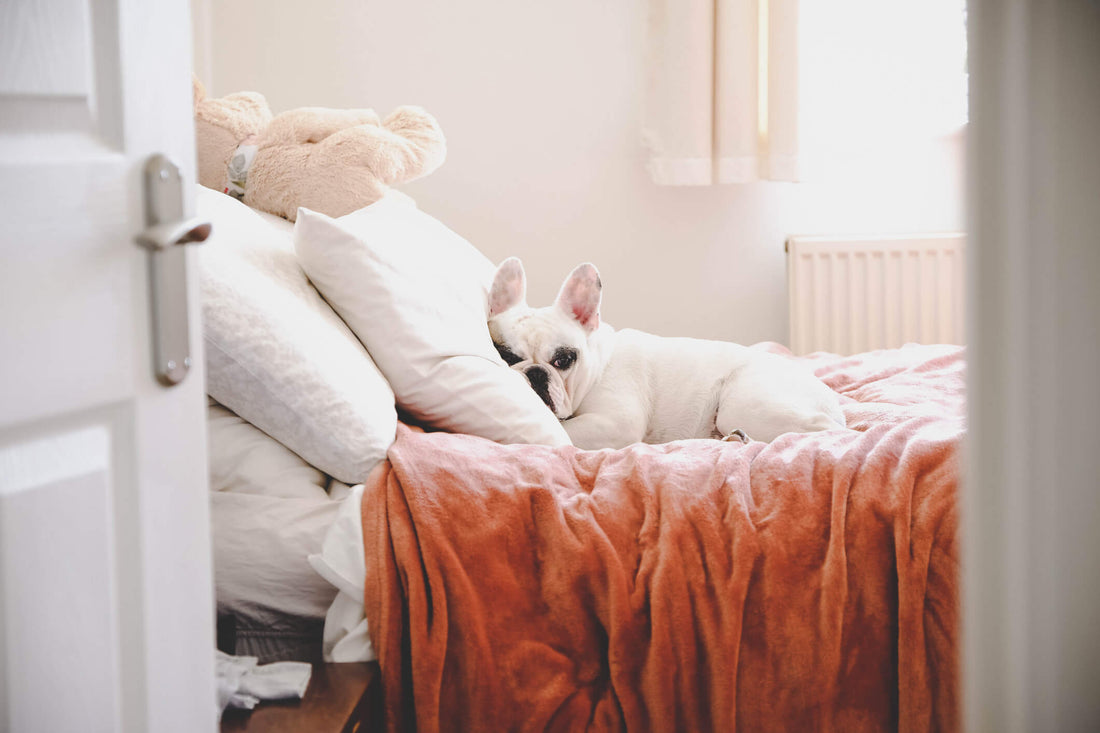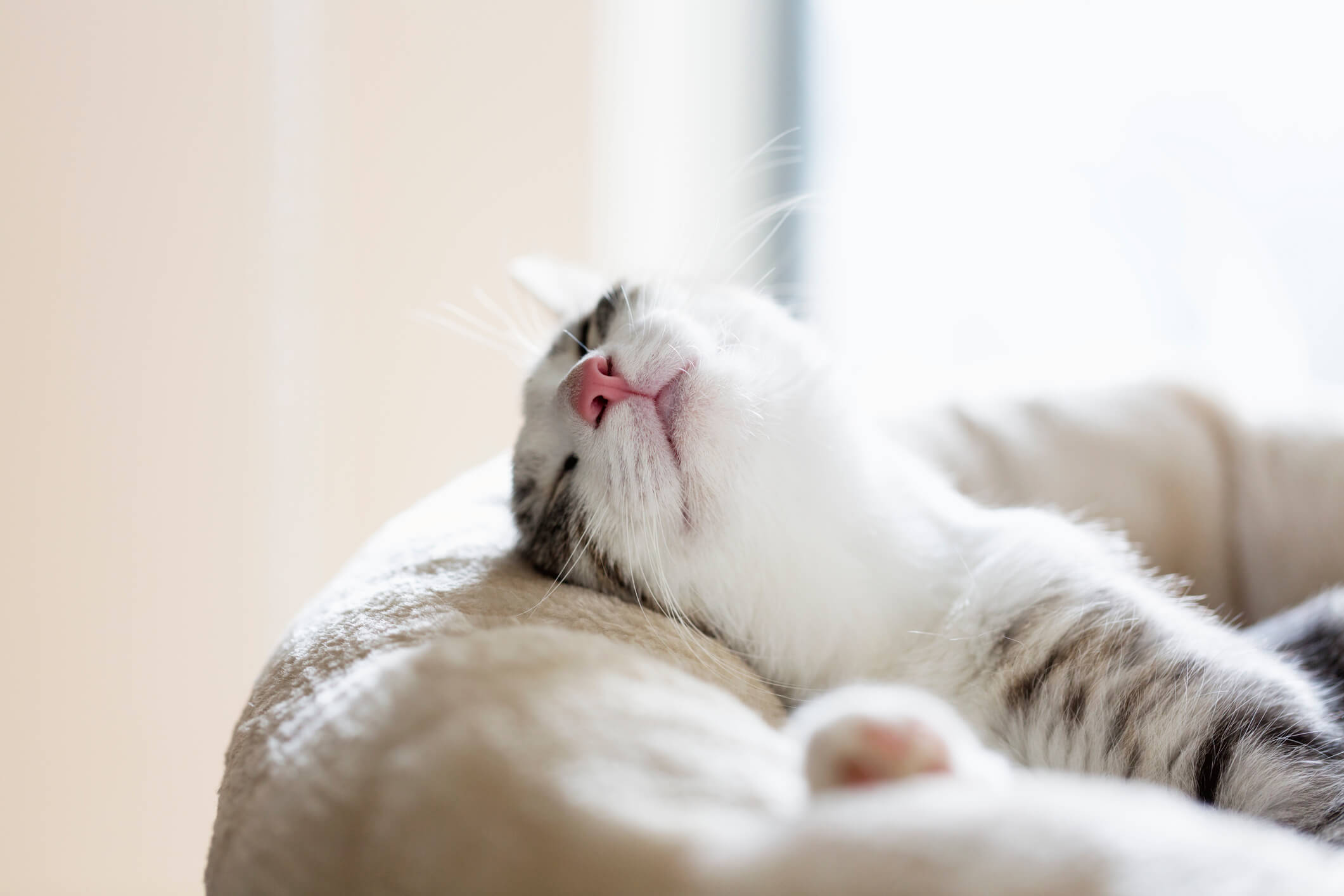
Pets Can Suffer from Sleep Apnea, Too!
Our pets spend a large chunk of their days sleeping. Whether they’re curled up in bed beside us or napping throughout the day, cats and dogs enjoy snoozing. However, with a lot of sleep comes the risk of a few sleep disorders like sleep apnea.
Both dogs and cats can suffer from forms of sleep apnea, just like humans can. Because sleep apnea is a potentially life-threatening condition, it’s extremely important that you know what to look for and seek veterinary help if your furry friend is having trouble breathing while they rest.
What is sleep apnea?
Sleep apnea is a disorder that affects your pet’s airway while they sleep. A temporary obstruction or collapse of the airway might be caused by abnormal respiratory anatomy or by excessive internal fat. Once the airway is restricted, your pet is unable to breathe, and they might jolt awake.
Sleep apnea can be quite dangerous for pets if they don’t wake up and move after their airway is obstructed. If they can’t get enough air, the condition could be fatal.
The sleep disorder also causes problems for pets in other ways. Jolting awake multiple times throughout the night disrupts your pet’s ability to sleep peacefully. This can make them more tired throughout the day, and they might even experience behavioral changes like irritability or stress.
In the long term, sleep deprivation is not good for cats or dogs, either. Proper sleep is as important for pets as it is for humans—it keeps their immune systems in good shape, it helps their bodies recover from fatigue, and it helps the brain process information and store memories. In worse cases, sleep deprivation can increase your pet’s risk of diabetes and heart disease. Months or years of disordered sleep could really take its toll on your pet’s health!
Sleep apnea versus snoring
Pet parents are probably used to their furry friend making some noise while they sleep. Some dogs and cats snore so loud, it might make you concerned! However, there’s a pretty stark difference between snoring and sleep apnea.
Snoring is caused by vibration in the tissues of the upper airway. Some pets snore every time they go to sleep, and some do it occasionally. For some pets, lying in a certain position exacerbates their snores and makes them louder.
Loud snoring might be present in pets with sleep apnea, but the actual condition also causes sounds that are more like gasps and chokes. If you watch your pet while they sleep, they might suddenly stop breathing, then gasp or choke as they jolt awake. Within a few moments, they usually settle back into sleep.
The waking signs of sleep apnea like sleepiness and irritability also help distinguish between general snoring and disordered sleeping caused by sleep apnea.

What pets are at risk?
Thankfully, sleep apnea is generally uncommon in pets. However, some cats and dogs are more at risk for the condition. First and foremost, obese pets are more likely to develop sleep apnea. Excessive fat around the airway can restrict breathing, especially when your pet lies in certain positions.
Breeds with flat faces (brachycephalic breeds) like Boston Terriers and Pugs and some cats are also more likely to experience sleep apnea because of their shortened noses and muzzles. Finally, pets with allergies that manifest in respiratory problems might also be at a higher risk for sleep apnea because the allergic reactions contribute to airway restriction.
Treating sleep apnea
Sleep apnea should be treated as soon as it’s discovered to allow your pet to get peaceful rest and prevent sudden death from the condition. Unfortunately, CPAP machines don’t exist for pets yet. Treatments for this sleep disorder include:
- Weight loss: Pets who have obstructive sleep apnea (sleep apnea caused by fatty obstructions) will likely need to be placed on a diet for controlled weight loss. In time, this can help reduce the pressure placed on the airway and prevent future apneas, in addition to protecting your pet from the other dangers of obesity.
- Humidifiers: Placing a humidifier in the room where you pet sleeps can also help prevent sleep apnea, especially if they experience this disorder because of allergies. Humidifiers add moisture to the air and help open your pet’s airways for easier breathing.
- Surgery: For pets with anatomy-related sleep apnea, surgery might be the best option to reduce airway obstruction and prevent future sleep problems. Soft palate surgery and nares resection are two common surgical procedures done on brachycephalic breeds, in particular.
Your vet will be able to determine the right treatment option for your pet. Follow their professional guidance to help your furry friend rest easy and snooze safely!


